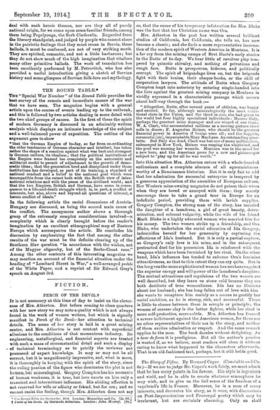FICTION.
PERCH OF THE DEVIL.t
IT is not necessary at this time of day to insist on the clever. ness of Mrs. Atherton. But before coming to close quarters with her new story we may note a quality which is not always found in the work of women writers, but which is signally manifest in Perch of the Devil—her attention to technical details. The scene of her story is laid in a great mining centre, and Mrs. Atherton is not content with superficial allusions to the conditions of that momentous industry. Its engineering, metallurgical, and financial aspects are treated with such a mass of circumstantial detail and such a display of technical terminology as to petrify the reviewer not possessed of expert knowledge. It may or may not be all correct, but it is magnificently impressive, and, what is more, it is thoroughly in keeping with the spirit of the story, since the ruling passion of the figure who dominates the plot is not human, but mineralogical. Gregory Compton has his moments of human weakness, it is true, but love exerts on him only a transient and intermittent influence. His abiding affection is not reserved for wife or affinity or friend, but for ore ; and we cannot resist the feeling, though Mrs. Atherton does not say • The Roultd TabL., fee September. 1914. London: Macmillan and Co. [2s. 8d. t Yoe& of the Dsvii. .14 Gertrude Atherton. London: John Niamey. Os.]
so, that the cause of his temporary infatuation for Mrs. Blake was the fact that her Christian name was Ora.
Mrs. Atherton in the past has written several brilliant studies of California, but California, she tells us, has now become a classic; and she finds a more representative incarna- tion of the modern spirit of Western America in Montana. It is a far cry from the mining camps of Bret Harte's early stories to the Butte of to-day. We hear little of revolver play tem- pered by quixotic chivalry, and nothing of privations and rough fare. Butte is prosperous, hideous, and politically corrupt. The spirit of brigandage lives on, but the brigands fight with their brains, their cheque-books, or the skill of corporation lawyers. The attitude of Butte when Geogory Compton leapt into notoriety by entering single-banded into the lists against the greatest mining company in Montana is
vividly expressed in a characteristic passage which occurs about half-way through the book :— " Altogether, Butte, after several years of oblivion, was happy and excited. So far, although mineralogically the most sensa- tional state in the Union, and the third in size, she had given to the world but four highly specialized individuals : Marcus Daly, perhaps the greatest mine manager and ore wizard of our time ; W. A. Clark, who accumulated millions as a moving picture show rolls in dimes ; F. Augustus Heinze, who should be the greatest financial power in America if brains were all; and the Sapphic, coruscatic [sic j, imperishable Mary MacLane. An outstanding quar- tette. But Daly was dead, Clark was but one of many millionaires, submerged in New York, Heinze was reaping the whirlwind, and the poet was nursing her wounds. Montana was in the mood for a new hero, and the American press for a new and picturesque subject to 'play up for all he was worth."
Into this situation Mrs. Atherton enters with a whole-hearted enthusiasm and a complete absence of all squeamishness worthy of a Renaissance historian. But it is only fair to add that her admiration for successful enterprise is tempered by a generous appreciation of the amenities of European culture. Her Western mine-owning magnates do not poison their wives when they are bored or annoyed with them: they merely encourage them to take a grand tour in Europe for an indefinite period, providing them with lavish supplies.
Gregory Compton, the strong man of the story, has married the daughter of a laundress, a. girl of great beauty, deter- mination, and colossal vulgarity, while the wife of his friend Mark Blake is a highly educated woman who married him for his money. The two women strike up a friendship, and Ora Blake, who undertakes the social education of Ida Gregory, indemnifies herself for her generosity by capturing the affections of Ida's husband. But it is only a partial capture, as Gregory's only love is his mine, and in the subsequent protracted duel for his possession Ida is reinforced with the weapons which have been furnished by her rival. On the other hand, Ida's influence has tended to enhance Ora's feminine attractiveness, so that to this extent they can cry quits. But in the long run the more sophisticated woman has no chance against the superior energy and will-power of the laundress's daughter. The mutual attractions and repulsions of the two women arc well described, but they leave ns stone cold because they are
both destitute of true womanliness. Ida has no illusions about her husband; she has long fallen out of love with him she wants to recapture hint mainly as a means to gratify her social ambition, as he is strong, rich, and successful. There is little to choose between them in scruple or principle ; the woman of coarser clay is the better fighter, while her rival is more self-protective, more subtle. Mrs. Atherton has framed a severe indictment against the American woman, for there are no other representatives of their sex in the story, and neither of them excites admiration or respect. And the same remark applies to the men. The book dazzles without delighting. As
a tour de force it is prodigious. But all the author's passion
is wasted if, as we believe, most readers will close it without caring to know what happened to the characters afterwards.
That is an old-fashioned test, perhaps, but it still holds good.


































 Previous page
Previous page